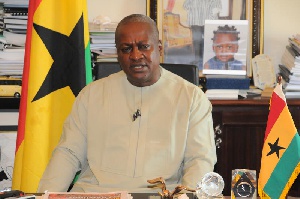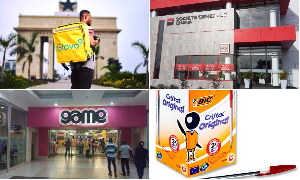- Home - News
- TWI News | TV
- Polls
- Year In Review
- News Archive
- Crime & Punishment
- Politics
- Regional
- Editorial
- Health
- Ghanaians Abroad
- Tabloid
- Africa
- Religion
- Election 2020
- Coronavirus
- News Videos | TV
- Photo Archives
- News Headlines
- Press Release
General News of Friday, 20 September 2013
Source: The New Statesman
Official: Mahama adds GHc15.6 billion to Ghana's total debt
Data from the Monetary Policy Committee of the Bank of Ghana has revealed that President John Dramani Mahama has added a whopping GHc15.6 billion to Ghana’s total public debt stock since being sworn into office as caretaker and substantive president within the period from July 2012 to August 2013.
The Monetary Policy Committee of the Bank of Ghana yesterday revealed that Ghana’s total public debt stock “increased to GHc43.9 billion (49.5% of GDP) at the end of August 2013, from GHc35.1 billion in December 2012.”
“Of this, the domestic component amounted to GHc24 billion compared to GHc18.5 billion in December 2012. External debt stood at US$10.2 billion, up from US$8.8 billion in December 2012,” a report by the committee explained.
However, checks made by the New Statesman further revealed that President John Dramani Mahama is responsible for contracting one-third of Ghana’s total debt stock.
According to the MPC report of September 2012, “The total public debt at the end of July 2012 was GHc28.3 billion, equivalent to 44.4 per cent of GDP.”
This implies that President John Mahama has contracted a total of GHc15.6 billion of debt for Ghanaians since becoming the President of Ghana.
Many people have wondered what the impact of these huge loans have been on the lives of Ghanaians, considering the continued labour agitations that have taken place over the last year, the arrears owed to contractors, GETFund, NHIS and other statutory funds.
Ghana’s total debt stock of GHc43.9 billion means that every Ghanaian, down to a newly born baby, owes a total of GHc1,688.42.
The increase in the domestic debt component of the total debt stock from GHc13.7 billion at the end of July 2012 to GHc24 billion under the Presidency of John Mahama lends credence to the statements made by the economic team of the New Patriotic Party to the effect that the NDC government is competing with the private sector for funds.
Analysts explain that what this means is that government has been competing with and squeezing out private enterprises from borrowing from the banks. Thus, private enterprises cannot access capital to grow their business in order to employ the youth.
The MPC report further stated that total revenue and grants amounted to GHc10.4 billion, lower than the target of GHc12.5 billion, mainly as a result of shortfalls in domestic revenue collections and low disbursement of grants.
Of this outturn, domestic revenue totaled GHc9.8 billion, below the target of GHc11.6 billion. Total tax revenue amounted to GHc7.7 billion, lower than the target of GHc9.1 billion. Grant disbursements were GHc542 million, falling short of its target by 41.7 percent. Non-tax revenues amounting to GHc2.1 billion for the period also missed the target by 12.4 per cent.
Total expenditure including clearance of arrears and outstanding commitments amounted to GHc16.0 billion, lower than the budget target of GHc17.5 billion.
“The above developments resulted in a fiscal deficit (cash basis) equivalent to 6.3 percent of GDP against a target of 5.6 percent. The deficit was financed mainly from domestic sources, resulting in a Net Domestic Financing (NDF) of GHc4.4 billion, higher than the budget target of GHc3.6 billion. Foreign financing of the budget amounted to GHc1.3 billion, marginally lower than the GHc1.5 billion target. Financing from Bank of Ghana amounted to GHc1.0 billion, equivalent to 4.9 percent of projected revenue,” the MPC added.











